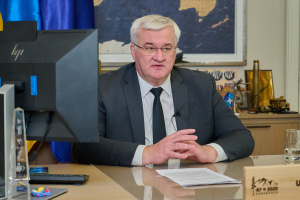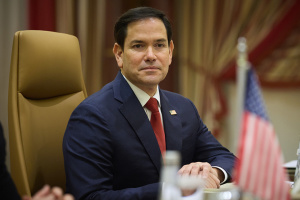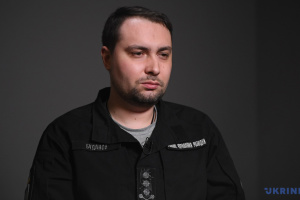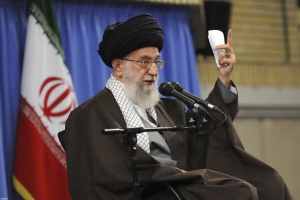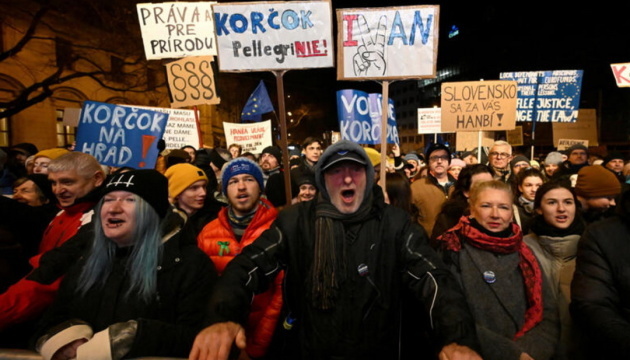
Protests in Bratislava: Has pro-Russian PM Fico heard people?
On March 12,000 of people protested in the Slovak capital Bratislava against the pro-Russian policies of Robert Fico's government. The action began with an air raid alert.
"Attention, air raid alert. Go to the nearest shelter. Do not be careless. Your overconfidence is your weakness," were the words in English that accompanied the signal.
The people who attended the rally are concerned about their government's harsh criticism of military aid to Ukraine and its desire to restore cultural and political ties with Russia. The most recent instance occurred this month when Slovak Foreign Minister Juraj Blanar held talks with his Russian counterpart Lavrov, a rare high-level meeting between a European Union member state and a country the EU has sought to isolate.
In addition, Fico defended his government's "balanced and sovereign" foreign policy and stated that there is no military solution to the conflict in Ukraine, which has been going on for more than two years after Russia's full-scale invasion.
He also halted arms aid to Ukraine, with the exception of commercial shipments, arguing that it would only prolong the fighting. Ukraine's Western allies rejected this argument, saying that cutting off aid would simply lead to Ukraine's defeat, not negotiations.
"I'm here because the actions of this government coalition are out of line," said Michal Hvoretsky, a protest organizer, Slovak writer and publicist, from the rostrum.
By the way, a poster with the inscription "Russia is a terrorist state" was hanging on the rostrum next to the flags of Slovakia, Ukraine, the European Union and NATO.
And these are the words of one of the protesters: "I don't like the direction our prime minister is taking after the election. I am disappointed. We are part of the West."
The organizers estimated that about five thousand people came to the rally. Is it a lot or not? We can't estimate, but let us remind you that earlier in January, Bratislava already protested against the Fico government. About 27,000 people gathered in the Slovak capital then.
However, the question is different: how will the situation develop in the future, will these protests have an effect, and most importantly, how will Fico and his company react to this? It should be remembered that Fico's party did not win a majority in the election, but only 23% of the vote. It is in a coalition. At the same time, there are quite strong pro-European parties in Slovakia that support our country and oppose Fico's policy.
However, Slovakia is not alone. Such protests in the European and global contexts are a good sign. It shows that the forces that are trying to prevent a right-wing Europe, that are opposing the impending revenge (this year there are many elections in different countries in which Euro-, NATO-skeptics, populists will take part - and don't go to the fortune teller, Rush will definitely interfere in them) are quite real, these forces exist, they are not giving up, and they will not give up. And this is extremely valuable, in particular in terms of preserving the unity of the West, unity in the European Union and NATO, and, in the end, it is especially valuable for us, a warring Ukraine that aspires to become a member of the Alliance and the EU.
We are asking experts what they think about all this.
THESE PROTESTS MAY FORCE FICO TO ADJUST HIS POLICY SOMEWHAT, BUT HE WILL NOT CHANGE HIMSELF
In a commentary to Ukrinform, diplomat Vadym Triukhan emphasizes that Fico is far from a newcomer to politics: "He has already been prime minister and he clearly understands the peculiarities of the political moment."
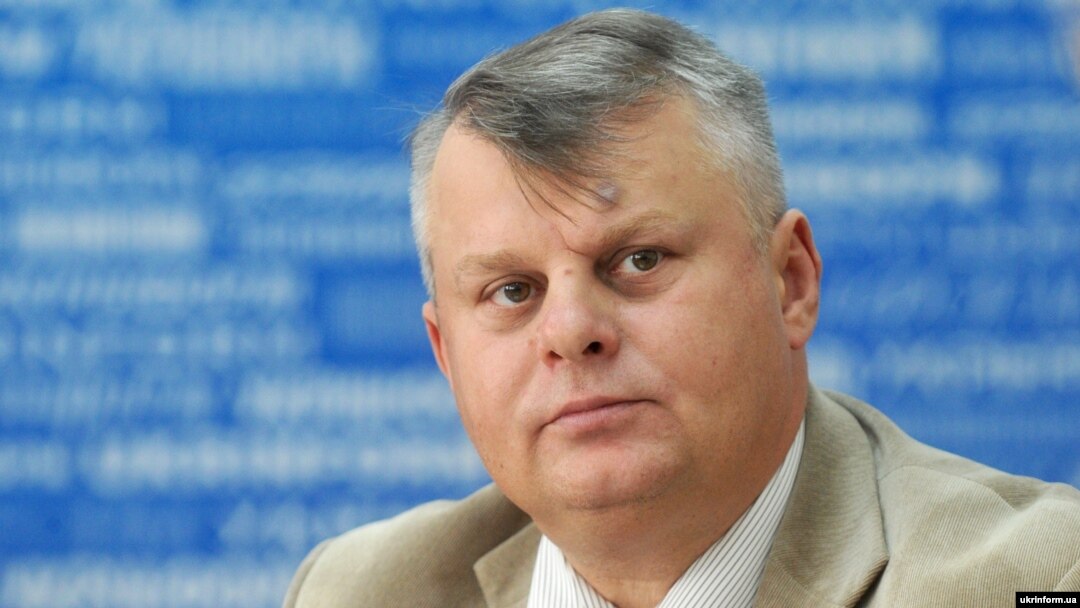
However, his latest "arrival" in the Slovak government was largely a coincidence, a coincidence of circumstances.
"If the pro-European political forces in Slovakia had not lost the trust of voters, if their leaders had not quarreled with each other, the pro-Russian Fico would have had absolutely no chance. However, he seized the moment very well. Moreover, he even managed to "put together" a coalition that was not originally going to include Piligrini, who now, by the way, has a good chance of becoming the next president of the country," says Mr. Triukhan. - "Therefore, on the one hand, Fico is trying to cement his power and somewhat repeats the path that Orban once took, but at the same time he is very moderate in his attitude to the demands of the street and his partners. And the fact that his actions and decisions often do not coincide with his rhetoric has already become indicative, because he supported all decisions concerning Ukraine at the EU and NATO level, he did not ban arms exports for his companies. And he even came to Ukraine, not to Kyiv, but to Uzhhorod, where he met with Prime Minister Shmyhal, but nevertheless."
In the diplomat's opinion, the protests, which he calls small in number, may force Fico to adjust his policy to some extent, but
"But these protests will not be critical for him. He will not change himself, and will continue to do one thing and say another. At least as long as Putin is in power, as long as Russia is not defeated in the war with Ukraine," the expert emphasizes.
At the same time, he draws attention to the fact that in many European countries, political forces have gained some weight, which, on the one hand, are oriented towards Russia and the restoration of full-fledged relations with it, and on the other
"They advocate greater sovereignty of their countries up to and including withdrawal from the EU and NATO. In France, this is the Le Pen movement, in Germany, the Alternative. And we're not talking about smaller countries like Slovakia and Hungary. It is clear where these forces come from - they are fueled by money and any other support from Russia, including information," the diplomat added.
Vadym Triukhan says that Russia continues to behave defiantly on the information front in Europe: "Information attacks on the minds of Europeans are ongoing. Moreover, they have recently intensified. Therefore, some Europeans are influenced by Russian propaganda. At the same time, this is a feature of the human psyche. In any country, there are extreme right-wingers and extreme left-wingers who advocate maximum sovereignty of their states, against globalization, against European integration, etc. But as of now, except for Hungary and Slovakia, where pro-European forces lost power largely by accident, no other European country has formed anti-European pro-Russian governments."
Even in the Netherlands, where a political party similar to those led by Orban and Fico won the election last year, it has long been impossible to form a coalition that would advocate a pro-Russian course and oppose European integration.
"Moreover, the leader of this party has even changed his rhetoric and no longer opposes assistance to Ukraine," the diplomat emphasizes. - "So, at the moment, there is no tendency for anti-European pro-Russian political parties to take power in European countries. But, nevertheless, we should be cautious and work proactively. We need to counteract Russian propaganda, explain to Europeans as much as possible what is happening in the world, what Russia is, how it works and influences minds, and what it wants to achieve. It seems to me that Europeans have been "harnessed" in this matter for quite a long time. And now there are still loopholes through which Russian propaganda is penetrating."
In general, such protests in favor of the EU, NATO, in support of Ukraine and against Putin are very important.
"This is evidence of the health of European societies, evidence that, despite the massive attack by the Russian propaganda machine, the Russians are not succeeding in achieving their desired goal. God willing, it will continue to be so," Vadym Triukhan summarized.
RALLIES IN EUROPE AND AMERICA CAN BECOME A POWERFUL MEANS OF PRESSURE TO START REAL ASSISTANCE TO UKRAINE
Political expert Yevhen Savisko believes that Fico will have to react.
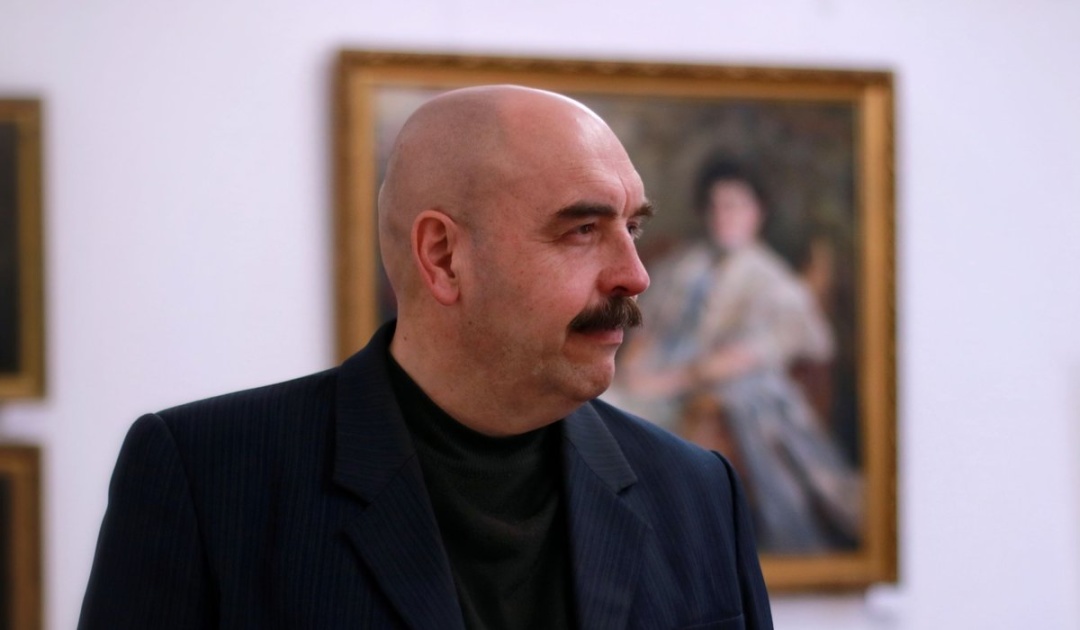
"Of course, now there will be rallies in his support. Then there will be opinion polls, the results of which will allow us to make reliable predictions. So far, the situation in Slovakia does not pose a threat to the pro-Russian government. However, if the protests continue, Fico will have to adjust at least partially his position on Ukraine and Russia," the expert says.
"Fico is skillfully playing up the fact that he is defending the interests of his country's citizens, and therefore takes the position of a supposed "peacemaker" in the Russian-Ukrainian war. This is very similar to the rhetoric of Viktor Orban. Such demagoguery allows them to stay afloat," emphasizes Mr. Savisko. - "The chances that the EU leaders will be able to influence the Slovak government look doubtful. They have been unable to do anything about Hungary for so many years, and now that they have a new ally, the chances of pacifying Putin's friends, and possibly agents, are slim."
But the protests are important because they show the position of citizens, which may not coincide with the position of their current governments.
"The more often they take place, the more people come to them, the more chances they have to influence both current government officials and MPs and future ones. Given the upcoming elections in Europe and the United States, the rallies could become a powerful means of pressure to start providing real assistance to Ukraine. It is very important that the Ukrainian diaspora, especially internally displaced persons, join such events," emphasized Yevhen Savisko.
THE SLOVAK GOVERNMENT IS A COALITION GOVERNMENT. THEREFORE, FICO, DESPITE HIS PRO-RUSSIAN STANCE, IS DOOMED TO MANEUVER
And this is the former Minister of Foreign Affairs of Ukraine Volodymyr Ohryzko: "What is the strength of Western society? It is in the fact that there are institutions that allow citizens, the source of power, to influence the politicians they elect. Yes, sometimes citizens are led to populism. In this context, we can talk not only about Fico, but also about Orban, about Germans who continue to support the right-wing populist Alternative for Germany, and about the French who are falling for Le Pen. This is all a sign that democratic societies allow for this kind of development. But once again, they have institutions, and when the pendulum swings too far in one direction or another, people protest to show the authorities that there are limits. And then the pendulum starts to return to the center. Democracy is not radicalism, but rather centrism. Left or right, but still centrism."
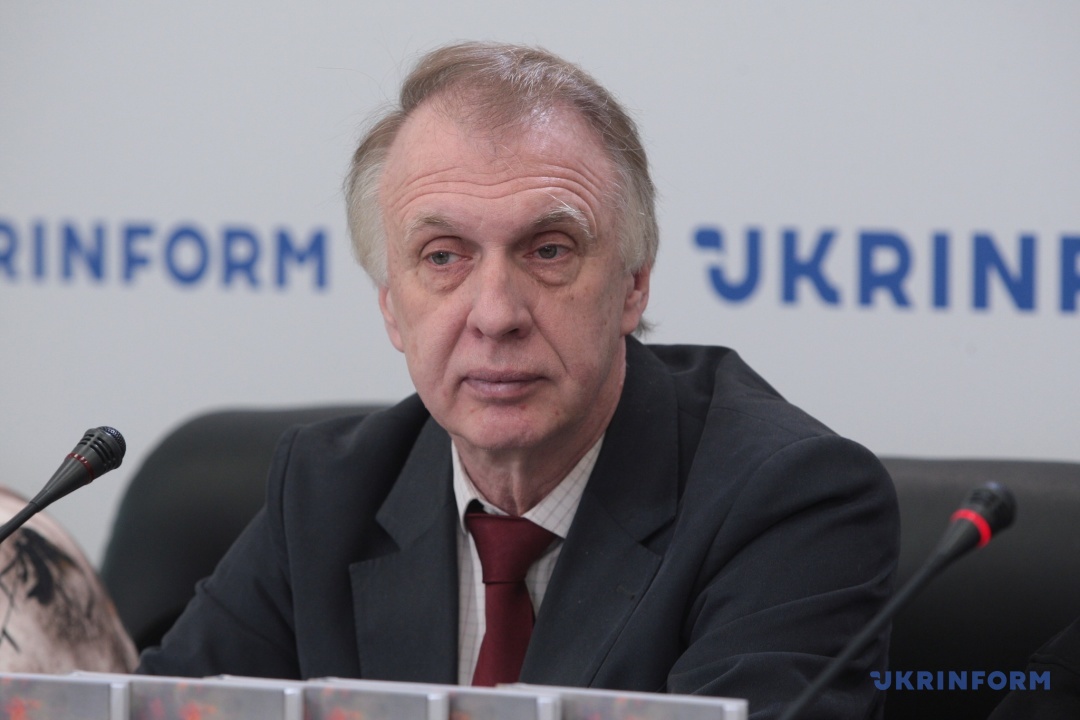
According to the expert, even if right-wing or left-wing populist forces are gaining popularity in some countries, they cannot become a long-term political mainstream.
"The main safeguard will be citizens who clearly understand the threat to democracy as such. In this context, the only exception is Orban, who has been fooling the majority of Hungarians for many years. But there is a separate influential factor there, which, for example, Slovaks and others do not have," the diplomat says.
This factor is called the "Trianon trauma" [the Trianon Peace Treaty of June 4, 1920 between the Entente countries and Hungary.], when 3/4 of the "original Hungarian lands" were taken away from the Hungarians as a result of the First World War. Orban built his political career on this, on the healing of this national trauma.
"The theme of 'greater Hungary' continues to be perceived by the population as something extremely important and right. And this gives Orban strength," says Mr. Ohryzko. - "Although it cannot be said that all this has 100% support in Hungary. There are adequate politicians and people there who understand that all this is just populism and nothing more. No country in the European Union, and Hungary is such a country, will make territorial claims to others. So I think we should not be too pessimistic in this regard. Yes, there are individual cases, but they are not at all threatening to peace and tranquility in Europe."
However, let's get back to Fico.
The diplomat claims that his worldview will not change under the pressure of the protests. Fico is a pronounced populist: "He has quite obvious ties to Moscow. Whether direct or indirect is unknown. But his rhetoric, and it coincides with what is said in the Kremlin, gives reason to think at least that way. So, if this connection really exists, we shouldn't expect anything else. They need to work out what they are given. This is their job. So I don't think we should expect any extraordinary changes from Fico. Politically, Fico is closer to Moscow than to Kyiv in terms of his thoughts and position. Although, when Fico is told, pencil in hand, what his pro-Moscow position will cost him and how much, he quickly changes it. Yes, he does not want to give Ukraine free weapons, but he does not forbid selling them. All in all, this is also a good option that suits us. Especially since we will be buying this or that weapon for the money of our partners."
Another important point: Fico is not the whole of Slovakia.
"Fico is the prime minister of a coalition government. And coalitions, as you know, can not only be formed but also "decompose". So even though he is mentally closer to Moscow, he will have to take into account the opinions of other coalition members. Of course, I cannot say that all coalition members are too pro-Ukrainian. This is not true. That is why Fico managed to form the government. However, there is at least one member of this coalition who, if Fico's policies cross the line of adequacy, may eventually withdraw from the coalition in order not to lose politically. So Fico, despite being pro-Russian, is still doomed to maneuver. And this is a really good sign, because it means that he can be influenced. Orban is different in this regard, he is the sole "ruler" of Hungary, which means that he is more difficult to deal with, but he can also be broken if necessary," Volodymyr Ohryzko emphasized.
ON MARCH 23, PRESIDENTIAL ELECTIONS WILL BE HELD IN SLOVAKIA, SO THESE PROTESTS ARE PARTLY RELATED TO THIS
Political analyst Olesya Tsybulko also calls these protests very important in terms of countering the current Slovak government: "To prevent them from destroying a lot of what was done during Fico's removal from power: anti-corruption policy, democratization of the country, social and international policy. Also very important is the issue of punishment for the brutal murder of a journalist and his fiancée, which led to Fico's resignation several years ago. It is believed that the people who ordered the murder were from Fico's inner circle, and people are worried that the evil will not be punished now."
Moreover, these protests give the pro-Western opposition the power to counteract the government.
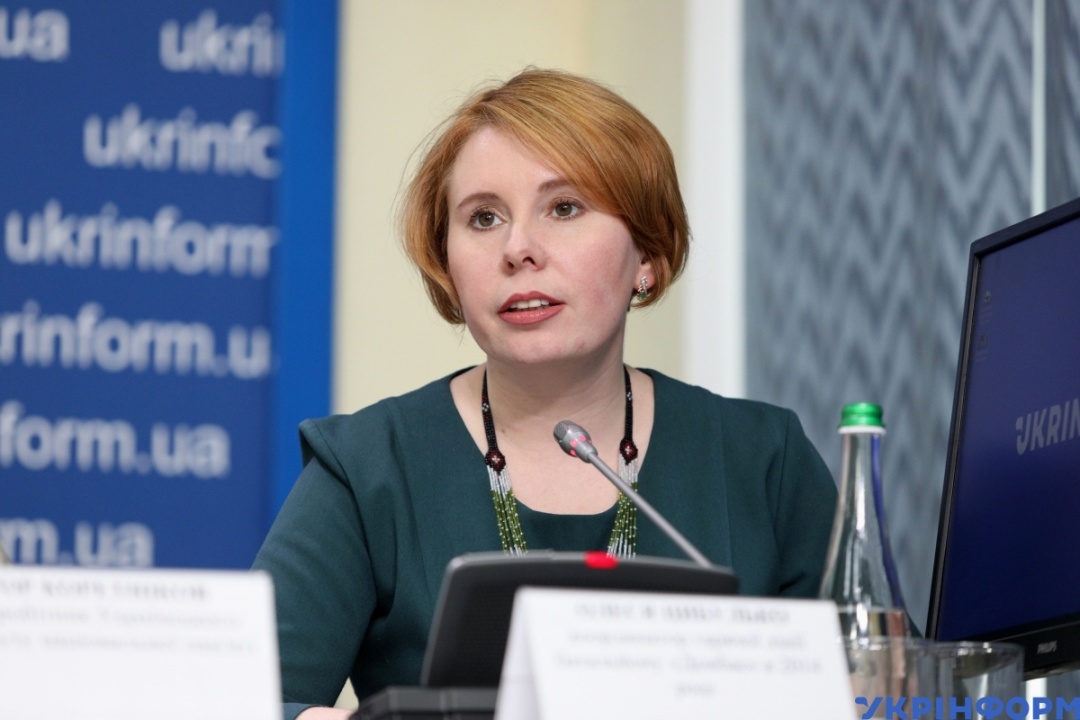
"They also provide an opportunity for people who do not support the coalition government to speak out and demonstrate their position," the expert says. - "Let's not forget that this is also an election campaign. Slovakia will hold presidential elections on March 23. Most of the opposition parties have united around Ivan Korczak, who is a diplomat and former foreign minister."
Currently, according to polls, Korczak and Pellegrini (the coalition candidate) are in a fierce battle: in the first round, the gap is only 1-2 percent, and in the second round, Pellegrini is still ahead by 4-5 percent.
"But these actions allow us to unite people and potential voters around Korczak. We will be rooting for the opposition candidate, because currently the president is Suzana Chaputova, who is considered pro-Western, and is currently the only one who can veto decisions made in parliament by the Fico coalition. If a candidate from the coalition becomes president, in fact, Fico and Pellegrini will receive almost all the power," summarized Olesya Tsybulko.
Myroslav Liskovych. Kyiv

